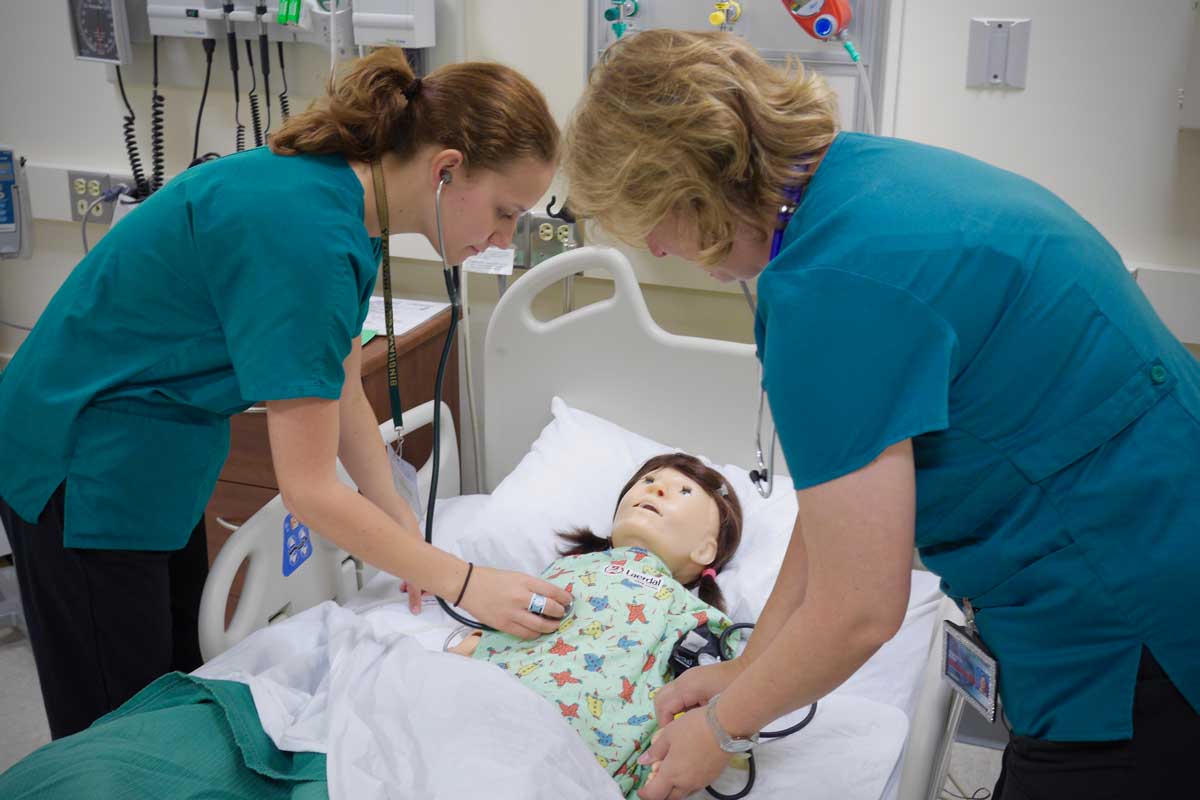Decker simulation center gains accreditation
First nursing school in New York to earn designation

Binghamton University announced today that the Decker School of Nursing Innovative Simulation and Practice Center (ISPC) has been accredited in Teaching/Education by the Society for Simulation (SSH) in Healthcare. Binghamton’s Decker School is the first nursing school in New York state to achieve this accreditation.
“The SSH accreditation confirms that the ISPC’s internal operations and teaching and educational programs meet rigorous international standards, as well as demonstrates the Decker School’s commitment to offering nursing simulation activities of the highest quality,” said Mario Ortiz, dean of the Decker School of Nursing. “We are proud to be the first nursing school in New York to earn this accreditation.”
Established in 2005, the ISPC is composed of the Practice Center and the Simulation Center.
- The Practice Center comprises a 10-bed hospital ward and four-bed examination area where undergraduate and graduate nursing students develop their skills.
- The Simulation Center comprises two rooms that resemble modern hospital rooms (these can be configured as emergency, critical care, medical-surgical or labor and delivery rooms) and two primary-care exam rooms. The rooms are equipped with video- and audio-recording capabilities that allow for recording simulation activities for subsequent review with students. The recordings are used for self-reflective professional growth, as a tool for debriefing an experiential activity and for graded competencies.
The ISPC is also equipped with eight high-fidelity patient simulators (mannequins) representing the lifespan from infant to adult, including one that gives birth. These remarkably lifelike simulators can present numerous clinical conditions and may also be programmed to respond to various medical interventions.
“We present students with real-life scenarios in the ISPC, so they can acquire experience, confidence and the skills they need to provide high-quality patient care,” said Patti Reuther, director of the ISPC. Reuther adds that the goal of simulation education is to increase patient safety and quality of care. “Simulation training creates an opportunity to practice high-risk, low-frequency situations for hands-on student learning in a safe, controlled environment.”
Simulations are built into all graduate and undergraduate clinical course curricula at the Decker School. According to Reuther, simulations ensure every student has the opportunity to experience important patient interactions they may not have the opportunity to see during a traditional clinical experience.
In 2016, the ISPC delivered 4,596 hours of simulation education to undergraduate nursing students and 1,631 hours of training to graduate nursing students. In addition, the center partnered with the Neonatal Intensive Care Unit at UHS Wilson Medical Center in Johnson City, N.Y., to provide simulations for their newly hired nurses to complete their Neonatal Resuscitation Program certification.
The ISPC will expand when the Decker School of Nursing relocates to 48 Corliss Ave. in Johnson City in 2020. This expansion will enable the center to deliver more simulation opportunities to Binghamton students, as well as to offer training opportunities to hospital personnel and other healthcare professionals in the area who can benefit from these educational experiences but don’t have their own simulation facilities and skilled personnel.
